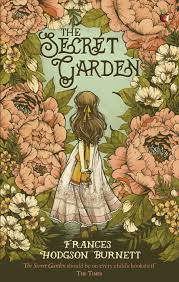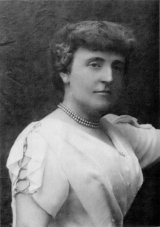The Secret Garden Page #8
The Secret Garden is a novel by Frances Hodgson Burnett first published in book form in 1911, after serialization in The American Magazine. Set in England, it is one of Burnett's most popular novels and seen as a classic of English children's literature. Several stage and film adaptations have been made.
Presently an old man with a spade over his shoulder walked through the door leading from the second garden. He looked startled when he saw Mary, and then touched his cap. He had a surly old face, and did not seem at all pleased to see her—but then she was displeased with his garden and wore her “quite contrary” expression, and certainly did not seem at all pleased to see him. “What is this place?” she asked. “One o’ th’ kitchen-gardens,” he answered. “What is that?” said Mary, pointing through the other green door. “Another of ’em,” shortly. “There’s another on t’other side o’ th’ wall an’ there’s th’ orchard t’other side o’ that.” “Can I go in them?” asked Mary. “If tha’ likes. But there’s nowt to see.” Mary made no response. She went down the path and through the second green door. There, she found more walls and winter vegetables and glass frames, but in the second wall there was another green door and it was not open. Perhaps it led into the garden which no one had seen for ten years. As she was not at all a timid child and always did what she wanted to do, Mary went to the green door and turned the handle. She hoped the door would not open because she wanted to be sure she had found the mysterious garden—but it did open quite easily and she walked through it and found herself in an orchard. There were walls all round it also and trees trained against them, and there were bare fruit-trees growing in the winter-browned grass—but there was no green door to be seen anywhere. Mary looked for it, and yet when she had entered the upper end of the garden she had noticed that the wall did not seem to end with the orchard but to extend beyond it as if it enclosed a place at the other side. She could see the tops of trees above the wall, and when she stood still she saw a bird with a bright red breast sitting on the topmost branch of one of them, and suddenly he burst into his winter song—almost as if he had caught sight of her and was calling to her. She stopped and listened to him and somehow his cheerful, friendly little whistle gave her a pleased feeling—even a disagreeable little girl may be lonely, and the big closed house and big bare moor and big bare gardens had made this one feel as if there was no one left in the world but herself. If she had been an affectionate child, who had been used to being loved, she would have broken her heart, but even though she was “Mistress Mary Quite Contrary” she was desolate, and the bright-breasted little bird brought a look into her sour little face which was almost a smile. She listened to him until he flew away. He was not like an Indian bird and she liked him and wondered if she should ever see him again. Perhaps he lived in the mysterious garden and knew all about it. Perhaps it was because she had nothing whatever to do that she thought so much of the deserted garden. She was curious about it and wanted to see what it was like. Why had Mr. Archibald Craven buried the key? If he had liked his wife so much why did he hate her garden? She wondered if she should ever see him, but she knew that if she did she should not like him, and he would not like her, and that she should only stand and stare at him and say nothing, though she should be wanting dreadfully to ask him why he had done such a queer thing. “People never like me and I never like people,” she thought. “And I never can talk as the Crawford children could. They were always talking and laughing and making noises.” She thought of the robin and of the way he seemed to sing his song at her, and as she remembered the tree-top he perched on she stopped rather suddenly on the path. “I believe that tree was in the secret garden—I feel sure it was,” she said. “There was a wall round the place and there was no door.” She walked back into the first kitchen-garden she had entered and found the old man digging there. She went and stood beside him and watched him a few moments in her cold little way. He took no notice of her and so at last she spoke to him. “I have been into the other gardens,” she said. “There was nothin’ to prevent thee,” he answered crustily. “I went into the orchard.” “There was no dog at th’ door to bite thee,” he answered. “There was no door there into the other garden,” said Mary. “What garden?” he said in a rough voice, stopping his digging for a moment. “The one on the other side of the wall,” answered Mistress Mary. “There are trees there—I saw the tops of them. A bird with a red breast was sitting on one of them and he sang.” To her surprise the surly old weather-beaten face actually changed its expression. A slow smile spread over it and the gardener looked quite different. It made her think that it was curious how much nicer a person looked when he smiled. She had not thought of it before. He turned about to the orchard side of his garden and began to whistle—a low soft whistle. She could not understand how such a surly man could make such a coaxing sound. Almost the next moment a wonderful thing happened. She heard a soft little rushing flight through the air—and it was the bird with the red breast flying to them, and he actually alighted on the big clod of earth quite near to the gardener’s foot. “Here he is,” chuckled the old man, and then he spoke to the bird as if he were speaking to a child. “Where has tha’ been, tha’ cheeky little beggar?” he said. “I’ve not seen thee before today. Has tha begun tha’ courtin’ this early in th’ season? Tha’rt too forrad.” The bird put his tiny head on one side and looked up at him with his soft bright eye which was like a black dewdrop. He seemed quite familiar and not the least afraid. He hopped about and pecked the earth briskly, looking for seeds and insects. It actually gave Mary a queer feeling in her heart, because he was so pretty and cheerful and seemed so like a person. He had a tiny plump body and a delicate beak, and slender delicate legs. “Will he always come when you call him?” she asked almost in a whisper. “Aye, that he will. I’ve knowed him ever since he was a fledgling. He come out of th’ nest in th’ other garden an’ when first he flew over th’ wall he was too weak to fly back for a few days an’ we got friendly. When he went over th’ wall again th’ rest of th’ brood was gone an’ he was lonely an’ he come back to me.” “What kind of a bird is he?” Mary asked. “Doesn’t tha’ know? He’s a robin redbreast an’ they’re th’ friendliest, curiousest birds alive. They’re almost as friendly as dogs—if you know how to get on with ’em. Watch him peckin’ about there an’ lookin’ round at us now an’ again. He knows we’re talkin’ about him.” It was the queerest thing in the world to see the old fellow. He looked at the plump little scarlet-waistcoated bird as if he were both proud and fond of him.
Translation
Translate and read this book in other languages:
Select another language:
- - Select -
- 简体中文 (Chinese - Simplified)
- 繁體中文 (Chinese - Traditional)
- Español (Spanish)
- Esperanto (Esperanto)
- 日本語 (Japanese)
- Português (Portuguese)
- Deutsch (German)
- العربية (Arabic)
- Français (French)
- Русский (Russian)
- ಕನ್ನಡ (Kannada)
- 한국어 (Korean)
- עברית (Hebrew)
- Gaeilge (Irish)
- Українська (Ukrainian)
- اردو (Urdu)
- Magyar (Hungarian)
- मानक हिन्दी (Hindi)
- Indonesia (Indonesian)
- Italiano (Italian)
- தமிழ் (Tamil)
- Türkçe (Turkish)
- తెలుగు (Telugu)
- ภาษาไทย (Thai)
- Tiếng Việt (Vietnamese)
- Čeština (Czech)
- Polski (Polish)
- Bahasa Indonesia (Indonesian)
- Românește (Romanian)
- Nederlands (Dutch)
- Ελληνικά (Greek)
- Latinum (Latin)
- Svenska (Swedish)
- Dansk (Danish)
- Suomi (Finnish)
- فارسی (Persian)
- ייִדיש (Yiddish)
- հայերեն (Armenian)
- Norsk (Norwegian)
- English (English)
Citation
Use the citation below to add this book to your bibliography:
Style:MLAChicagoAPA
"The Secret Garden Books." Literature.com. STANDS4 LLC, 2024. Web. 25 Nov. 2024. <https://www.literature.com/book/the_secret_garden_427>.




Discuss this The Secret Garden book with the community:
Report Comment
We're doing our best to make sure our content is useful, accurate and safe.
If by any chance you spot an inappropriate comment while navigating through our website please use this form to let us know, and we'll take care of it shortly.
Attachment
You need to be logged in to favorite.
Log In